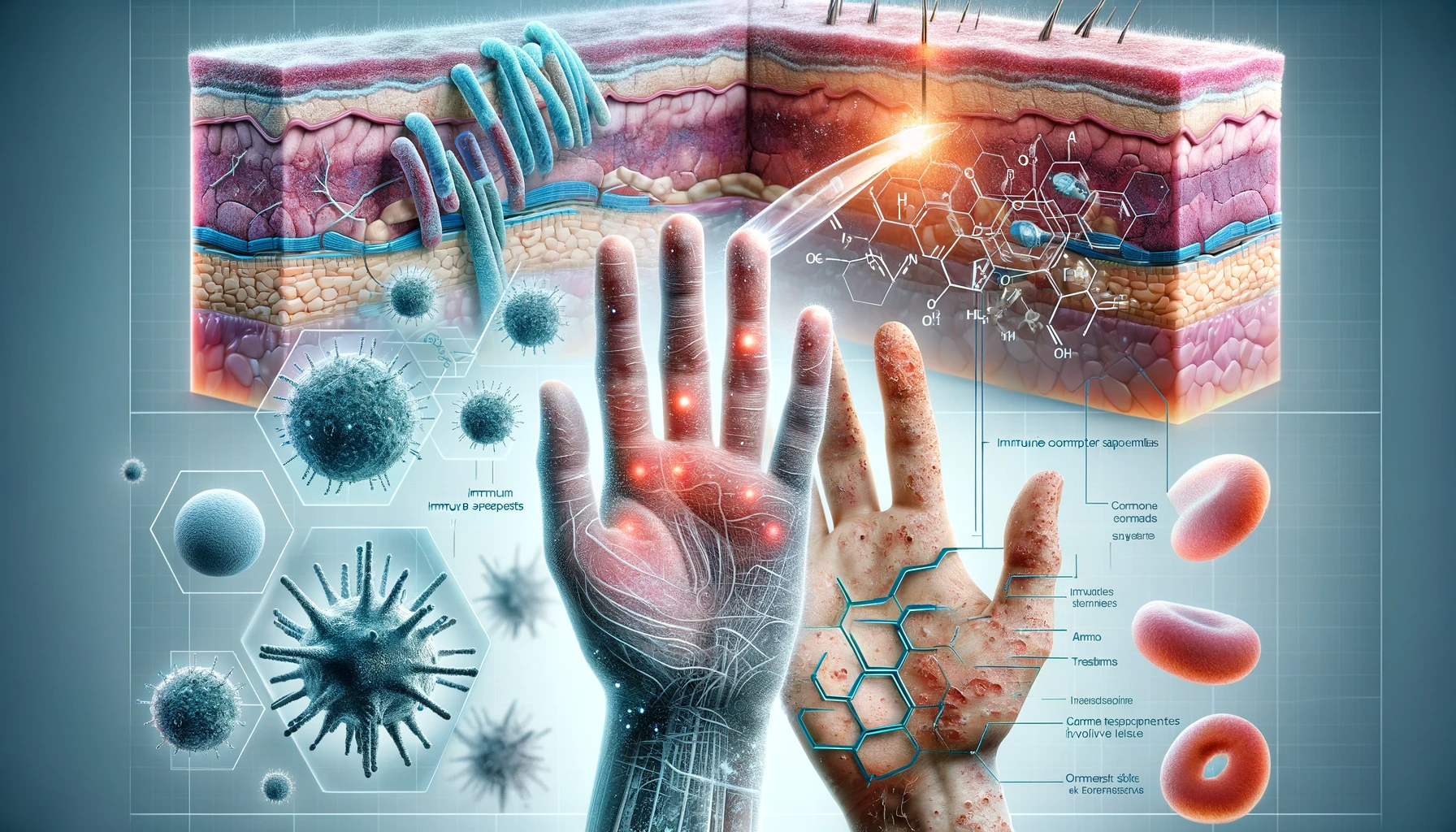Introduction to Eczema and Isotretinoin
Eczema, a common skin condition characterized by itchy, inflamed patches, affects millions globally. Simultaneously, isotretinoin, known for its acne-treating capabilities, emerges as a potential player in the dermatological field. This exploration begins by unfolding the layers of eczema and isotretinoin, setting the stage for a deeper understanding of their relationship.

The Science of Eczema
Eczema isn’t just a single condition; it’s a group of diseases causing skin inflammation and irritation. Various triggers and symptoms paint a complex picture of eczema, necessitating a tailored approach to treatment.

RELATED ARTICLE : INDING ECZEMA RELIEF FOR BLACK AND BROWN WOMEN WITH SEVERE ITCHY SCALP
Isotretinoin Explained
Originally developed for severe acne treatment, isotretinoin has evolved in its usage. Understanding its mechanism and widespread dermatological applications is crucial in evaluating its suitability for eczema treatment.
Eczema Treatments: Traditional Methods
Before delving into isotretinoin’s role, it’s essential to understand the traditional therapies for eczema. From corticosteroids to immunosuppressants, these treatments set the baseline for comparison.
Isotretinoin for Skin Conditions
While primarily an acne treatment, isotretinoin’s effects on other skin conditions have been noted. It’s worth exploring its track record to assess its potential applicability to eczema.
The Connection Between Eczema and Isotretinoin
Is there a direct link between isotretinoin use and eczema improvement? We’ll examine clinical studies and medical evidence to answer this pivotal question.
Pros and Cons of Using Isotretinoin
Every medication comes with its set of advantages and drawbacks. This section weighs isotretinoin’s benefits against its risks, especially in the context of eczema.
ALSO : ANTI-AGING SERUM: 6 MOST EFFECTIVE INGREDIENTS
Patient Experiences with Isotretinoin
Patient stories and experiences provide invaluable insights into isotretinoin’s real-world impact. This section delves into the narratives of those who have walked this path.
Alternative Treatments for Eczema
Isotretinoin isn’t the only option. We explore natural remedies and new therapies, offering a comprehensive view of the eczema treatment landscape.
Comparing Isotretinoin and Standard Eczema Treatments
A side-by-side comparison of isotretinoin with conventional eczema treatments offers a clearer understanding of its relative effectiveness and suitability.
Expert Opinions on Isotretinoin for Eczema
What do dermatologists say about isotretinoin for eczema? This section pools expert opinions, providing a professional perspective on this potential treatment.
Lifestyle and Dietary Considerations in Eczema Management
Managing eczema isn’t just about medication. Lifestyle and diet play a pivotal role, and this section covers how these factors intertwine with eczema symptoms.
Skin Care Routines for Eczema Patients
A good skincare routine can be a game-changer for eczema sufferers. This section offers practical tips for daily skin care and managing flare-ups.
Understanding the Risks: Isotretinoin Side Effects
While isotretinoin can be effective, it’s not without risks. We discuss its side effects, both immediate and long-term, providing a comprehensive risk assessment.
Eczema and Mental Health
Eczema’s impact goes beyond the skin. This section addresses the psychological aspects and offers strategies for coping with the emotional burden of the condition.
Isotretinoin in the Long Run: Long-term Use and Effects
The long-term use of isotretinoin raises questions about its sustainability and long-term health impacts. This section explores these aspects in-depth.
Frequently Asked Questions About Treating Eczema with Isotretinoin
Is Isotretinoin Effective for All Types of Eczema?
Isotretinoin’s effectiveness varies across different types of eczema. It is primarily used for acne treatment and its use in eczema is less common and more experimental. Some patients may see improvement, while others may not find it beneficial. It’s important to consult with a dermatologist to understand if isotretinoin is suitable for your specific type of eczema.
What Are the Risks of Using Isotretinoin for Eczema?
The use of isotretinoin, especially for conditions other than severe acne, carries several risks. These include dry skin, which can exacerbate eczema symptoms, and more serious side effects like birth defects, liver damage, and mental health issues. Close monitoring by a healthcare professional is essential.
Can Lifestyle Changes Improve Eczema Symptoms?
Yes, lifestyle modifications can significantly impact eczema management. This includes maintaining a regular skin care routine, using gentle, fragrance-free products, avoiding known irritants, managing stress, and possibly adjusting your diet to avoid foods that might trigger eczema flare-ups.
Are There Any Natural Alternatives to Isotretinoin for Eczema?
There are various natural alternatives that can be explored for eczema management. These include herbal remedies, such as aloe vera and chamomile, which have soothing properties, as well as dietary changes and stress-reduction techniques like yoga and meditation. However, it’s important to discuss any alternative treatments with your healthcare provider before starting them.
How Do Dermatologists Decide if Isotretinoin is Right for an Eczema Patient?
Dermatologists consider several factors before prescribing isotretinoin for eczema. These include the severity and type of eczema, the patient’s medical history, the response to other treatments, and the potential risks and benefits of using isotretinoin. The decision is made on a case-by-case basis.
What Should I Do if I Experience Side Effects from Isotretinoin?
If you experience side effects while using isotretinoin, it’s important to contact your healthcare provider immediately. They can assess the severity of the side effects and decide whether to adjust the dosage, switch to a different treatment, or discontinue the medication.
Conclusion and Future Directions
The journey concludes with a summary of key findings and a look at potential future research directions in eczema treatment.





